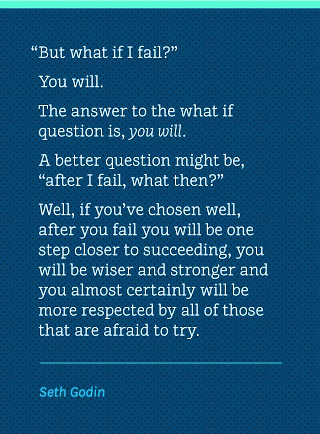Think of the successful business people you know or know of. They probably run different kinds of businesses, even non-profits. Their businesses are different sizes, too – from solopreneurs to multi-national conglomerates. They represent different sectors of business from manufacturing and selling products to offering personal services – and everything in between.
What is the first thing most of them have in common? Most of them, at one time or another, have failed.
Some of their failures were highly visible – and well publicized. Some of their failures are never to be spoken of (meaning we have no idea what they are.) In some cases they lost life savings, or millions of dollars, or years of time.
What is the second thing those who failed have in common?
They all learned from their experiences – and then they tried again – and found themselves succeeding far beyond what they might have achieved otherwise.
Why? Because they all learned – very well – the hard way.
True confessions:
In the early 1980s, I started a crafting business where I made stuff and sold it at flea markets and craft fairs. I had a blast! But it really just cost me a fortune, because I didn’t understand how my time equated to making enough money to keep myself afloat.
As a business woman, I was a failure.
A few years later, I started and built a newsletter publishing business, just as desktop publishing was beginning to make the scene. Since I better understood how time equated to income, I was able to price and plan my work, even hire staff to help. My marketing knowledge helped us grow very fast, and very strong.
My business thrived – UNTIL – I took on a business partner who turned out to be a shyster, who cooked the books, and who forced me to close the business. A nightmare! It took me years to recover from that experience, during which time I had to get a job and a paycheck from someone else.
But – I didn’t just give up!
Instead, I began to read everything I could get my hands on about entrepreneurship and building a business. I figured out what I had done right, what I had not done well, and what I had done wrong. I consulted with small business advisers (through my local SBDC – Small Business Development Center). I networked with other small business people and consumed as much information as I could. I embraced the idea of coopetition instead of competition, and I learned to trust my intuition more than simple paperwork and planning, because that was specifically what had gotten me into trouble with my publishing company….
Then I tried again in 2001, starting my marketing consultancy (with a focus on moving small businesses to the web). My business grew and thrived, based on what I had learned the hard way, and the questions I had subsequently known to ask before I started again. Then, after my misdiagnosis odyssey in 2004, I sold my marketing company for a sum of money beyond what I ever expected – so I could focus full time on patient empowerment and patient advocacy.
So why do I confess all this to you?
Because failure is not what most of us think it is – and – because it happens to most of us. Failure is just the next step on our road to success.
Success comes from picking ourselves up at least one more time than we fall down. It’s not the falling down itself! It’s learning from the mistakes we make and using what we learn to be better than before.

Since starting the Alliance of Professional Health Advocates, I’ve relied on those great business tenets I’ve learned through my failures and have made sure of two things:
1. that we grow this organization making smart business choices and strong alliances for its members
2. that the information and support available to members will support success, or at least prevent as many total failures as possible (or at least will give members a soft place to fail.)
However – with a caveat: Just joining the Alliance doesn’t mean the good information available will simply osmose! The tools and information are available…. it’s up to members to seek it out, to read and study and practice good business. The same is true for the patient advocate handbooks – just buying them doesn’t make you immediately a smart business person. Read, implement and adjust.
But I’ve digressed…
What I worry about are those people who dismiss this kind of advice, thinking they don’t need it at all, or assuming that since they have JOINED, or PURCHASED, they will succeed. It doesn’t work that way!
I promise you that if you think you can succeed at private, independent advocacy without actually investing the TIME you need to study, interact, and learn…. well…. then….
You WILL fail. And, at least for advocacy, there’s little chance you’ll be able to pick yourself up to succeed unless you make a concentrated effort to learn from your failure.
If you feel as if you are a failure, or that you’re bordering on it… The only time it’s too late to make a correction is when you give up. Seek business advice, ask about doing things more effectively and efficiently, begin delving into all there is to learn about the business of advocacy. That’s your road to recovery – and success.
Have you failed – only to succeed later? Please share your story below.
LEARN ABOUT APHA MEMBERSHIP | MASTER LIST OF PRACTICE RESOURCES | ONLINE LEARNING







Trisha,
What a terrifically honest blog and so true!
In the startup world there is a saying “first you fail” which means you have to learn the hard way what you don’t know.
I can relate to that. After a successful corporate and consulting career in healthcare, I started a media business. I had the mentorship of a top investment banker, an amazing team consisting of talent from ESPN, Food Network, etc. and I was willing to put my money–a lot of it–on the table. What I didn’t know is that content was about to explode with the advent of YouTube and other platforms and that it would largely be free. I also didn’t appreciate that I was out of my wheelhouse. My career was in healthcare, not media.
Once I faced the music and the realization that I wasn’t going to be able to pay the bills with my media company, I pivoted back to my strength, listened to what the universe was telling me (“this is your calling” said so many friends and family members as I partnered with my father in law over many years of cancer treatments), did a business plan and launched Patient Advocators. This business leveraged everything from my past and in particular the web skills I acquired with my media startup and was successful from day one.
I could have hung up my entrepreneurial aspirations, but it was always the goal. I just didn’t have the right idea at the right time.
Long way of saying, I couldn’t agree more.
Thank you for putting it out there.
AnnMarie McIlwain
Patient Advocators
AnnMarie – thank YOU for sharing your experience!
What readers should know is that today AnnMarie is one of our most successful independent advocates. She jumped into advocacy with both feet, embraced the learning curve of both business and advocacy, and has set the bar very high for what we call “successful.”
And – I expect she will agree with me when I say that using the knowledge acquired through failure to later succeed fantastically, is a sweet, sweet feeling!
I think we often learn more from failures than from successes…we learn what not to do! I certainly learned what kind of boss I didn?t want to be from horrible job situations working for abusive bosses! Being afraid to fail prevents you from trying so many things including experiences that can lead to great success. Excellent blog.
What great advice. Hoping those wanting to Patient Advocates will heed this incredible advice. Will be happy topass this on to anyone I know who would be considering this endeavor.